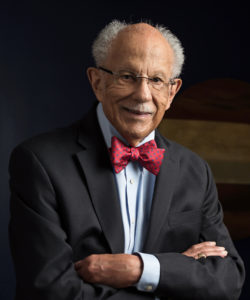Warren M. Washington

The Tyler Prize is deeply saddened at the passing of Dr. Warren M. Washington, atmospheric scientist and 2019 Tyler Prize Laureate, on October 18, 2024 at the age of 88.
Dr. Washington was a towering figure in climate science, internationally recognized for his pioneering work in climate modeling, climate change research, and atmospheric sciences. He was also a tireless advocate for diversity in science, serving as an inspiration to countless aspiring scientists from underrepresented backgrounds. Dr. Washington was only the second African American to earn a PhD in Meteorology, a testament to his brilliance and perseverance in a field that was, at the time, largely closed to people of color.
Warren Washington was born on August 28, 1936 in Portland, Oregon, USA. He later obtained both his bachelor’s and master’s degrees from Oregon State University before earning his PhD in Meteorology from Pennsylvania State University in 1964. His interest in meteorology was sparked by a summer job he had at a weather station, where he found himself captivated by storm patterns. This early experience likely shaped his career path, leading him to a career focused on atmospheric sciences and climate modeling.
His groundbreaking research using computer models to study the Earth’s climate has fundamentally shaped our understanding of climate change and its impacts. His early work, which relied on room-sized, clunky computers, laid the foundation for the sophisticated climate models used today. Dr. Washington’s models were among the first to incorporate crucial elements like sea ice, ocean currents, and vegetation, making them remarkably accurate in projecting long-term climate trends.
Beyond his scientific contributions, Dr. Washington was deeply committed to public service, advising six consecutive US Presidents on climate change and serving as Chair of the National Science Board. He was a strong advocate for evidence-based policymaking and believed that climate scientists had a responsibility to communicate their findings clearly to policymakers and the public if they were to have the desired impact. His efforts were recognized through numerous awards, among them the National Medal of Science, presented by President Obama in 2010, and a share in the International Intergovernmental Panel on Climate Change (IPCC) 2007 Nobel Peace Prize, in recognition of his contributions to climate science.
Dr. Washington’s legacy extends far beyond his impressive list of publications and awards: he will be remembered most notably for the lives and careers he shaped through his advocacy and work with minorities in the sciences. He had a deep understanding of the challenges experienced by those from underrepresented groups, and mentored countless young scientists, paving the way for a more diverse and inclusive scientific community. He was also a founding member of the Black Environmental Science Trust. His commitment to fostering the next generation of climate scientists ensures that his impact will continue to be felt for years to come.
The Tyler Prize remembers Dr. Warren M. Washington not only for his scientific brilliance but also for his humanity, his commitment to justice, and his unwavering belief in the power of science to improve the world. He will be deeply missed.
Selected quotes from Dr. Warren Washington (taken from an interview with the Tyler Prize, January 17, 2019):
“We are not doing enough about cutting back on the use of fossil fuels – therefore, we are going to get the biggest and worst effects from climate change over the next 50 or 60 or 70 years”.
“We need to take very large societal steps to cut back on the use of fossil fuels”.
“I think it is more healthy for society when we have a good representation of everybody who come from different backgrounds and cultures”.
“My time with Obama showed me that he actually spends a lot of his time preparing his talks, so that they’re carefully worded and carefully researched. He actually tries to understand the details of what he’s doing… President Trump does not get briefed or study what the science community knows about climate change or doesn’t know. Moreover, the present president is not concerned about details and whether it is scientifically accurate or not.”
